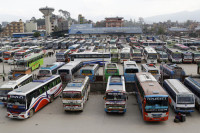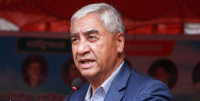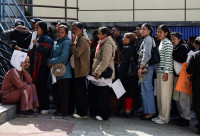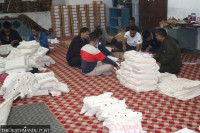National
After successful kidney transplant, Oli recovers at Teaching Hospital
The transplanted kidney has started functioning and the prime minister’s health is normal, attending doctors said after the surgery.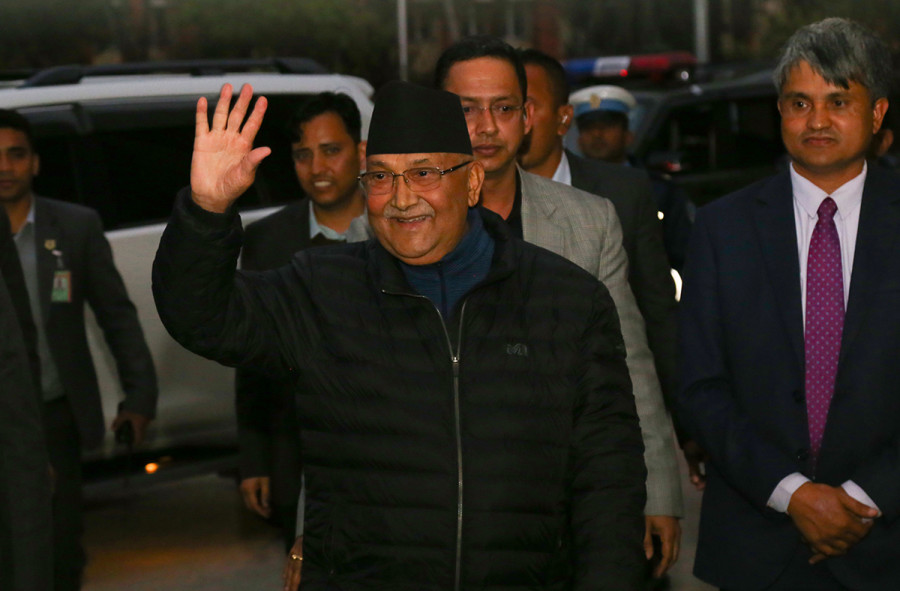
Arjun Poudel
Prime Minister KP Sharma Oli successfully underwent a second kidney transplant surgery on Wednesday at Tribhuvan University Teaching Hospital.
"The surgery was successful and the new kidney has already started functioning,” Dr Prem Krishna Khadga, director at the Teaching Hospital, told the Post after the surgery. “The prime minister’s health is stable now.”
Thirty-two-year-old Samikshya Sangraula's left kidney was transplanted into Oli. Sangraula is from Charali, Jhapa and is reportedly Oli’s niece by relation.
Both Oli and Sangraula were admitted to the hospital on Monday.
It took around five hours for a team of surgeons, led by Dr Prem Raj Gyawali, a consultant urologist and kidney transplant surgeon, to complete the surgery. The team also included doctors Uttam Sharma, head of the urology and kidney transplant department at the TU Teaching Hospital, Pawan Chalise, Suman Chapagain, Manish Pradhan, Sujit Poudel, Dibash Gyawali and Purushotam Parajuli.
“Two operation theatres ran simultaneously at the time of transplantation,” Gyawali told the Post. “Around 20 doctors were involved in the treatment process.”
Two doctors, including Ananta Kumar, a senior transplant surgeon from Indraprastha Apollo Hospital in New Delhi, were also at the hospital to assist the Nepali team of doctors. Kumar was the doctor who conducted Oli’s first kidney transplant in 2007.
In a statement after the surgery, the hospital said that most of the prime minister’s vital signs were good.
“Sangraula’s health condition is also normal,” said the statement.
According to the hospital, Dr Dibya Singh Shah, Oli’s personal physician, along with doctors Mahesh Sigdel, Mukunda Kafle and Rabin Nepali will closely monitor the prime minister’s health condition around the clock.
Oli and Sangraula were moved to the post-operative intensive care unit on Wednesday evening.
The transplanted kidney has started to function and has already discharged urine, which is a good sign, say nephrologists.
“This also means that the first and most difficult part of the surgery has been successfully completed,” Dr Rishi Kumar Kafle, a senior nephrologist, told the Post.
Doctors involved in the prime minister’s surgery, however, have not said when he will be discharged from the hospital.
“In the post-operative intensive care unit, doctors need to monitor the prime minister’s oxygen saturation levels, urine discharge and other vital signs,” said Dr Pukar Chandra Shrestha, executive director at the Human Organ Transplant Centre in Bhaktapur, who himself performs kidney transplants in the country.
According to Shrestha, after the kidney transplant, patients should pass at least three litres of urine a day.
“Usually, patients are discharged five to seven days after surgery,” Shrestha told the Post. “But patients should refrain from working or meeting people for at least a few weeks after being discharged.”
Health experts say that the immediate concerns after renal transplantation are infection and possible rejection by the host body.
A nephrologist who did not want to be identified said that the first day of surgery just means that the organ has been properly connected to the recipient's body.
“In order to call it a completely successful surgery, we need to wait at least three months,” he said. “Medically, chances of rejection cannot be ruled out even after discharge and a patient needs to be constantly and closely monitored for three months.”
After a renal transplant, patients need to be administered high doses of immunosuppressants to prevent rejection, but that raises the risk of infection.
“This is the critical part of a kidney transplant,” said the nephrologist. “The recipient’s age and other health factors are important when it comes to accepting or rejecting a new kidney.”
Twelve years after Oli’s first kidney transplant, symptoms of dysfunction had started to show in September last year. Oli had then travelled to Singapore for treatment where he underwent plasmapheresis and dialysis.
Since the end of October, Oli had been regularly undergoing dialysis—twice a week—in Kathmandu.
But in November, Oli had another health scare when he was admitted to the Manmohan Cardiothoracic Vascular and Transplant Center for severe stomach ache. He was diagnosed with appendicitis and had to undergo an appendectomy. But since he had developed peritonitis, an inflammation of the peritoneum, a silk-like membrane on the inner abdominal wall, the kidney transplant plan was delayed by a few months.
Though Oli’s doctors had been mulling over a second kidney transplant for quite some time, a decision was only taken on Sunday.




 19°C Kathmandu
19°C Kathmandu
